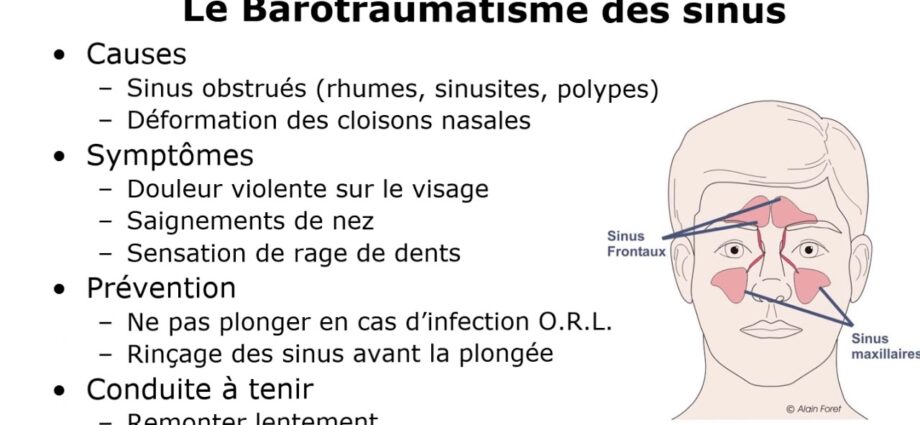Contents
Barotraumatism
Barotraumatic otitis is an injury to the tissues of the ear caused by a change in pressure. It can cause severe pain, damage to the eardrum, hearing loss and vestibular symptoms. Depending on the symptoms, barotrauma is treated by administering decongestants and / or antibiotics. In some cases, surgery is necessary. Ear barotrauma can be avoided by transmitting the right actions to be taken in subjects at risk (divers, aviators).
Barotraumatic otitis, what is it?
Barotraumatic otitis is an injury to the tissues of the ear caused by a sudden change in air pressure.
Causes
Barotrauma occurs when the body is subjected either to an increase in pressure (scuba diving, loss of altitude in a plane) or to a drop in pressure (plane gaining altitude, diver coming to the surface).
Barotraumatic otitis is caused by a malfunction of the eustachian tube, the duct located at the level of the eardrum that connects the pharynx to the middle ear. When there is a change in outside pressure, the eustachian tube balances the pressure on both sides of the eardrum by allowing outside air to enter (or exit) the middle ear. If the eustachian tube is defective, air cannot exit or enter the middle ear, resulting in barotrauma.
Diagnostic
The diagnosis is made according to the nature of the symptoms and the patient’s history (diving, altitude flight). Depending on the symptoms, additional examinations may be necessary:
- Audiometric tests (intelligibility threshold, voice discrimination, acoustic reflexes, etc.)
- Tests vestibulaires
The people concerned
Barotrauma particularly affects people subject to strong variations in pressure in their work environment, in particular divers and airmen. Ear barotrauma accounts for two thirds of scuba diving accidents.
Risk factors
Any inflammation (due to allergy, infection, scar, tumor) of the upper airways (pharynx, larynx, nasal passages) or ear that prevents the pressures from balancing increases the risk of barotrauma.
Symptoms of barotraumatic otitis
The manifestations of a barotrauma occur almost instantly when the pressure changes.
In the event of eustachian tube dysfunction, the difference in air pressure between the eardrum and pharynx can cause:
- A violent pain deep in the ear
- Hearing loss which can go as far as deafness
- Damage or even perforation of the eardrum which can lead to bleeding
- Vestibular symptoms (dizziness, nausea, vomiting)
- If the pressure difference is too large, the oval window (entering the inner ear from the middle ear) may also rupture. Following this rupture, all the cavities of the ear communicate causing the leakage of fluid from the inner ear into the middle ear. The inner ear is at risk of permanent damage.
Treatment of barotraumatic otitis
In most cases of barotrauma, treatment is symptomatic. But some lesions may require specific treatment. Ear barotrauma is treated by administering decongestants (oxymetazoline, pseudo-ephedrine) to facilitate the opening of blocked airways. Severe cases can be treated with nasal corticosteroids.
If there is bleeding or signs of effusion, antibiotics are given (for example, amoxicillin or trimethoprim / sulfamethoxazole).
The consultation of an ENT is indicated in front of severe or permanent symptoms. Surgery may be necessary to treat severe damage to the inner or middle ear. For example, tympanotomy for direct repair of the ruptured round or oval window, or myringotomy to drain fluid from the middle ear.
Prevent barotraumatic otitis
Prevention of barotraumatic otitis involves educating those at risk (aviators, divers, hikers). When the external pressure changes, it is important not to have too high slope speeds. Aviators and scuba diving professionals must be trained in a box to study the consequences of pressure variations on the ear.
Ear barotrauma can be prevented by swallowing or exhaling frequently while pinching the nostrils to open the eustachian tubes and balance the pressures between the middle ear and the outside. Wearing earplugs prevents pressure balancing, so it should be avoided while scuba diving.
Preventive treatment with pseudoephedrine 12 to 24 hours before diving can reduce the risk of atrial barotrauma. Scuba diving should not be practiced if the congestion does not resolve.










